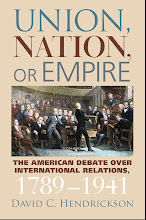Maxims represent the accumulated wisdom of the human race and should always be consulted as a potential corrective to current infatuations. They are often a lot more valuable, as expressing the essence of a situation, than ponderous theory building enterprises. Herewith, therefore, a collection of voices rising from the grave to illuminate these deep questions of debt and credit. Except for the last entry from Benjamin Franklin, to which I am very partial, all are drawn from H. L. Mencken, A New Dictionary of Quotations On Historical Principles From Ancient and Modern Sources (Knopf, 2001).
"Debt is the slavery of the free." Publilius Syrus: Sententiae, c. 50 B.C.
"Debt is better than death," James Howell, Proverbs, 1659.
"Pride does not like to owe, and self-love does not like to pay." La Rochefoucauld, Maxims, 1665.
"Better go to bed supperless than rise in debt." John Ray, English Proverbs, 1670.
"Out of debt, out of danger." Thomas Fuller, Gnomologia, 1732.
"Living upon trust is the way to pay double." Ibid.
"Sins and debts are always more than we think them to be." Ibid
"Debt is a preceptor whose lessons are needed most by those who suffer from it most." R.W. Emerson, Nature, 1836.
"There are but two ways of paying debt--increase of industry in raising income, increase of thrift in laying out." Thomas Carlyle, Past and Present, 1843
"A national debt, if it is not excessive, will be to us a national blessing." Alexander Hamilton, Letter to Robert Morris, April 30, 1781
"I place economy among the first and most important of republican virtues, and public debt as the greatest of the dangers to be feared."
Thomas Jefferson, Letter to Governor Plumer, 1816.
"The principle of spending money to be paid by posterity, under the name of funding, is but swindling futurity on a large scale." Jefferson, Letter to John Taylor, 1816.
"It is incumbent on every generation to pay its own debts as it goes--a principle which, if acted on, would save one-half the wars of the world." Jefferson, Letter to Destutt Tracy, 1820.
"Public credit means the contracting of debts which a nation never can pay." William Cobbett, Advice to Young Men, II, 1829.
"We are opposed to the issuing of interest-bearing bonds of the United States in time of peace." Democratic National Platform, 1896.
"He that hath lost his credit is dead to the world." George Herbert, Outlandish Proverbs, 1639.
"Credit lost is like a Venice-glass broken." John Ray, English Proverbs, 1670
"In this institution of credit, which is as universal as honesty and promise in the human countenance, always some neighbor stands ready to be bread and land and tools and stock to the young adventurer." R.W. Emerson, The Conservative, 1841.
"No man's credit is as good as his money." E.W. Howe, Sinner Sermons, 1926.
"Credit, like a looking-glass
Broken once, is gone, alas!"
Author unidentified.
"As a very important source of strength and security, cherish public credit. One method of preserving it is to use it as sparingly as possible." George Washington, Farewell Address, September 17, 1796.
"In those circumstances we cannot be too careful to preserve the friendships we have acquired abroad, and the Union we have established at home, to secure our Credit by a punctual discharge of our obligations of every kind, and our Reputation by the wisdom of our councils: since we know not how soon we may have a fresh occasion for friends, for credit, and for reputation." Benjamin Franklin to President of Congress, October 22, 1783.
skip to main |
skip to sidebar

YOU HAVE EVERY RIGHT TO FEEL THAT WAY.
This blogbook offers, with the aid of various charts, graphs, and tables, a pictorial guide to the 2008 financial crisis.
Navigation
Table of Contents
To see the presentation in order, use either the Labels below for each chapter or the Table of Contents for individual entries.
The initial presentation was made in October 2008 and was last updated in January 2009, though I recently substantially expanded the list of sources. Lately, I have been working on a blogbook called Energy Predicament.
June 2011
To see the presentation in order, use either the Labels below for each chapter or the Table of Contents for individual entries.
The initial presentation was made in October 2008 and was last updated in January 2009, though I recently substantially expanded the list of sources. Lately, I have been working on a blogbook called Energy Predicament.
June 2011
Featured Posts
Labels
- A. Introduction (4)
- B. Financial Stress (19)
- C. Housing Bubble (11)
- D. Debt Binge (14)
- E. Derivatives Jungle (7)
- F. Scale of Losses (7)
- G. Rescues and Remedies (12)
- H. Global Imbalances (6)
- I. Lessons (9)
Top Stops in the Financial Blogosphere
-
-
Why Trump Will Win The Tariff War3 hours ago
-
-
-
-
-
Economic Theory Summer Camp3 days ago
-
The Elephant In The Room3 days ago
-
-
This is the End and a New Beginning1 month ago
-
-
RTO Gets Serious: October 12 years ago
-
-
A Few Quick Announcements2 years ago
-
-
Links 5/7/20223 years ago
-
Thinking Outside the Grid6 years ago
-
-
The rise and fall of bitcoin8 years ago
-
The Blog Moves On8 years ago
-
Learning from Harvey8 years ago
-
Supply-Side Amnesia8 years ago
-
A Trip Through Putin Country8 years ago
-
Surviving America’s Political Meltdown8 years ago
-
Revenge of the Experts8 years ago
-
A Dim Outlook for Trumponomics8 years ago
-
-
-
Thursday Morning Link9 years ago
-
-
-
-
-
-
Q&A: The Fed’s Rate Cut17 years ago
-
-
-
-
-
About Me
I like charts.
I am not a dismal scientist.
My name is David Hendrickson. I teach international relations and American foreign policy at Colorado College.
My dubious record for 2008 is reviewed here, by some miscreants.
I am not a dismal scientist.
My name is David Hendrickson. I teach international relations and American foreign policy at Colorado College.
My dubious record for 2008 is reviewed here, by some miscreants.
FEELING GLUM AND OUT OF SORTS, PERHAPS A BIT ANGRY?

YOU HAVE EVERY RIGHT TO FEEL THAT WAY.
Kudos
A good number of my charts first appeared at Contrary Investor. Though oriented toward investors, CI offers a superb analysis of the real economy and its relationship to the financial system. It is an indispensable source not only for individuals but also for any good library. So subscribe, dammit.

